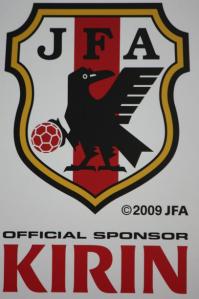The will-they-won’t-they concerning Japan’s participation in the Copa America is dragging on a bit so I decided to clear it up for Weekly Soccer Magazine.

The J.League and JFA certainly have some tricky decisions to make over the coming weeks, and just how the five rounds of postponed J.League matches can be made up in an already packed schedule is not an easy problem to solve.
Luckily I have had a lot of time on my hands lately though, and so have been able to come up with the answer for Mr. Ogura and Mr. Ohigashi: and the good news is that the J.League and Copa America can both still go ahead.
Essentially there were three options available:
Option 1. The national team travel to Argentina with any players that Zac wants to take and the J.League keeps the mid-season break as scheduled. The five rounds of matches are then made up throughout the course of the season, with one extra round per month in May, June, September, October and November.
Option 2. The national team withdraw from the Copa America and during that scheduled five week break the J.League make up the matches.
Option 3. The national team still take part in the Copa America and the J.League play rounds 2-6 at the same time. Either Zac is asked to function without any J.League regulars, or clubs are asked for their co-operation in the matter.

None of these options are ideal and somewhere along the line somebody is going to have to compromise. However, the recent events in Tohoku mean that flexibility is required – and should be expected – to resolve the situation.
Initially I was leaning towards the first option. All of the J.League players are professional athletes who are paid to keep themsleves in top physical condition. As such, asking them to play five matches a month rather than four is not a particulalry big demand. As a fellow journalist pointed out to me the other day, if Crawley Town of the English Blue Square Premier League (5th Division) can play twice a week, then surely J.League players can.
The problem with this option though was the break in the middle of the season. The more I considered it, the more that five-week period bugged me. It would essentially be a week for each player who is actually likely to be missing from the J.League and featuring for Japan in Argentina (Nishikawa, Inoha, Tulio, Endo, Maeda). This seems like an awful lot of time to be wasting when there are games to be played, and so I began to consider option 2.
The national team pulling out of the Copa America would ease the strain on the players but it just seems a little drastic – again bearing in mind the number who will actually be missing from the J.League. There are a few other domestic players who are on the fringes of the national team (Iwamasa, Kashiwagi, Fujimoto, Honda) but their spots could easily be filled by young J.Leaguers yet to cement places at their clubs, or J2 or University players.

And so I settled for option 3; the best of both. But, are J.League teams asked to get by without their stars or does Zac have to choose his squad solely from overseas players and the lesser-lights?
The latter. The Copa America is, essentially, meaningless. Japan are travelling to Argentina to gain experience (and probably make a few yen, of course), and none of the J.League players who will be missing out are lacking in either. The European-based players will have finished their seasons by then and will bring more than enough quality to the squad, with the remaining places being taken up by satellite members of J1 teams, second division players and members of Sekizuka’s Under-22 team.
If I were in charge, for example, my squad would look something like this:
Eiji Kawashima, Shuichi Gonda, Shunsuke Ando; Atsuto Uchida, Takuya Okamoto, Michihiro Yasuda, Maya Yoshida, Tomoaki Makino, Yasuyuki Konno, Yuto Nagatomo; Yuki Abe, Makoto Hasebe, Hajime Hosogai, Keigo Higashi, Akihiro Ienaga, Ryo Miyaichi, Kazuya Yamamura, Daisuke Matsui; Shinji Kagawa, Shinji Okazaki, Keisuke Honda, Takayuki Morimoto, Shoki Hirai.
Still a strong line-up, with some potential Samurai Blue regulars of the future getting some crucial experience around the full national team, while the J.League can go about its business as usual until December.
So there you have it, problem solved.















